九年级英语Unit1教案
- 格式:doc
- 大小:348.50 KB
- 文档页数:11
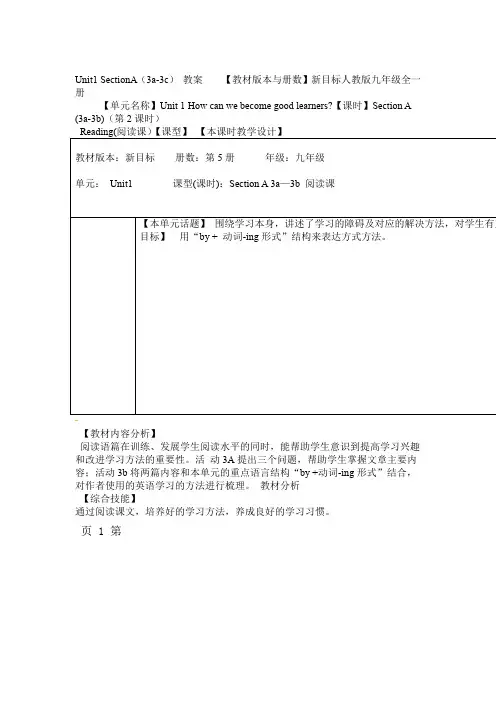
Unit1 SectionA(3a-3c)教案【教材版本与册数】新目标人教版九年级全一册【单元名称】Unit 1 How can we become good learners?【课时】Section A (3a-3b)(第2课时)【教材内容分析】阅读语篇在训练、发展学生阅读水平的同时,能帮助学生意识到提高学习兴趣和改进学习方法的重要性。
活动3A提出三个问题,帮助学生掌握文章主要内容;活动3b将两篇内容和本单元的重点语言结构“by +动词-ing形式”结合,对作者使用的英语学习的方法进行梳理。
教材分析【综合技能】通过阅读课文,培养好的学习方法,养成良好的学习习惯。
页 1 第Do you learn English by reading aloud?How can I improve my pronunciation? 教学目标:情感态度价值观目标。
“一份耕耘,一份收获”通过对学习方法的学习,培养学生用正确而科学的方法做事的能力,明白1.教学重点:后面by“,译成靠、通过”。
……by 1.学会运用“by + doing”的结构表达做事方式。
介词,表示“通过方法或途径”可以加名词或动名词短语。
教学重难点动名词的构成:动词后加动名词doing,相当于名词,在句子中可以做主语、宾语、表语定语等。
2.教学难点:,相当于名词,在句子中可以做主语、宾语、表语定语等。
doing 动名词的构成:动词后加动名词建议教法情景交际法,任务型教学法教学流程(详见活动设计)页 2 第学生利用老师提供预备2的背景知识激活学生的前期知识,培的信息回答。
养学生良好的预习习惯。
与激真实情景式导入话题,激发学生的活先2. 期知学习兴趣识Look at the picture on page 3, 2. Warming up:Let the students talk about:The girl is Wei Fen. What is she doing?Can you guess how she studies English?页 3 第页 4 第页 5 第watching meaning by 1) I can understand the (读后)动,再核对,检验,用优教同步学习卡进行抢答,their on their _______and the __________ ) (5 mins 修正并反思。
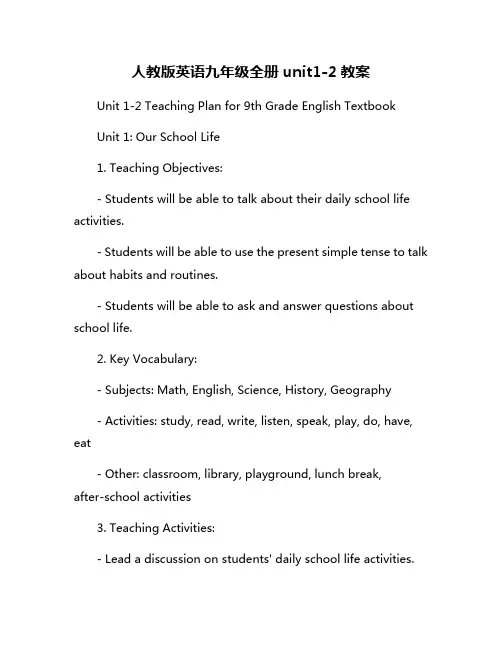
人教版英语九年级全册unit1-2教案Unit 1-2 Teaching Plan for 9th Grade English TextbookUnit 1: Our School Life1. Teaching Objectives:- Students will be able to talk about their daily school life activities.- Students will be able to use the present simple tense to talk about habits and routines.- Students will be able to ask and answer questions about school life.2. Key Vocabulary:- Subjects: Math, English, Science, History, Geography- Activities: study, read, write, listen, speak, play, do, have, eat- Other: classroom, library, playground, lunch break,after-school activities3. Teaching Activities:- Lead a discussion on students' daily school life activities.- Introduce vocabulary and practice pronunciation.- Discuss routines and habits using the present simple tense.- Role-play asking and answering questions about school life activities.- Present a short video or audio clip of a typical school day.- Have students create a daily schedule for themselves and share with the class.4. Assessment:- Quizzes on vocabulary and grammar usage.- Oral presentations of daily schedules.- Written assignments on describing school life activities.Unit 2: The World Around Us1. Teaching Objectives:- Students will be able to talk about different countries and cultures.- Students will be able to use adjectives to describe places and people.- Students will be able to use comparative and superlative forms.2. Key Vocabulary:- Countries: China, Japan, France, Brazil, Australia- Adjectives: beautiful, crowded, modern, traditional, diverse- Comparative and Superlative Forms: bigger, more crowded, most diverse3. Teaching Activities:- Introduce the countries and their cultures through pictures and videos.- Discuss the adjectives used to describe different places and people.- Practice using comparative and superlative forms in sentences.- Have students work in pairs to compare two countries of their choice.- Conduct a class debate on the best country to visit based on the criteria discussed.4. Assessment:- Quizzes on vocabulary and grammar structures.- Written assignments comparing two countries.- Oral presentations on a chosen country's culture and attractions.Overall, the teaching plan for Unit 1-2 of the 9th-grade English textbook focuses on developing students' language skills in talking about daily routines and school life activities, as well as describing different countries and cultures. Through a variety of vocabulary and grammar exercises, as well as interactive activities and discussions, students will be engaged and motivated to learn English in a fun and meaningful way.。
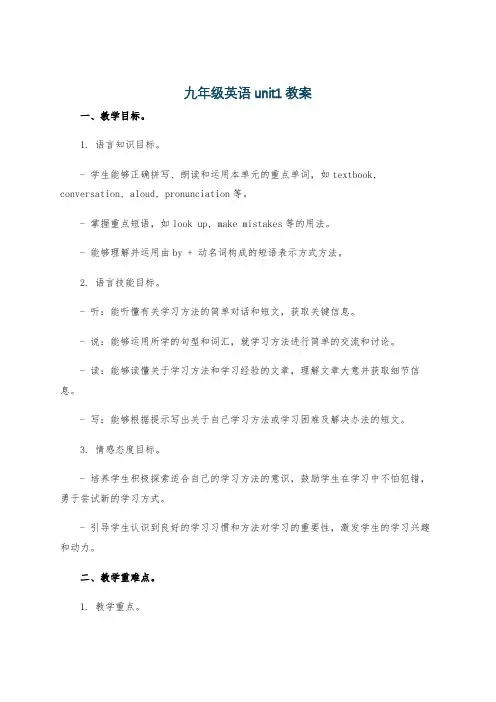
九年级英语unit1教案一、教学目标。
1. 语言知识目标。
- 学生能够正确拼写、朗读和运用本单元的重点单词,如textbook, conversation, aloud, pronunciation等。
- 掌握重点短语,如look up, make mistakes等的用法。
- 能够理解并运用由by + 动名词构成的短语表示方式方法。
2. 语言技能目标。
- 听:能听懂有关学习方法的简单对话和短文,获取关键信息。
- 说:能够运用所学的句型和词汇,就学习方法进行简单的交流和讨论。
- 读:能够读懂关于学习方法和学习经验的文章,理解文章大意并获取细节信息。
- 写:能够根据提示写出关于自己学习方法或学习困难及解决办法的短文。
3. 情感态度目标。
- 培养学生积极探索适合自己的学习方法的意识,鼓励学生在学习中不怕犯错,勇于尝试新的学习方式。
- 引导学生认识到良好的学习习惯和方法对学习的重要性,激发学生的学习兴趣和动力。
二、教学重难点。
1. 教学重点。
- 重点单词、短语和句型的学习与运用。
- 理解并掌握by + 动名词结构表示方式方法的用法。
2. 教学难点。
- 能够运用所学知识,针对不同的学习问题提出有效的解决方法。
- 如何引导学生在实际生活中运用正确的学习方法提高学习效率。
三、教学方法。
1. 情景教学法。
通过创设各种与学习方法相关的情景,让学生在真实的语境中学习和运用英语。
2. 任务驱动法。
布置各种任务,如小组讨论、角色扮演、写作任务等,让学生在完成任务的过程中提高语言综合运用能力。
3. 交际教学法。
鼓励学生之间进行交流和互动,培养学生的英语口语表达能力和交际能力。
四、教学过程。
(一)导入(5分钟)1. 展示一些名人学习的图片,如爱因斯坦、居里夫人等,然后提问学生:“What do you think made them successful in their study?”引导学生思考成功学习的因素,从而引出本节课的话题——如何成为好的学习者。
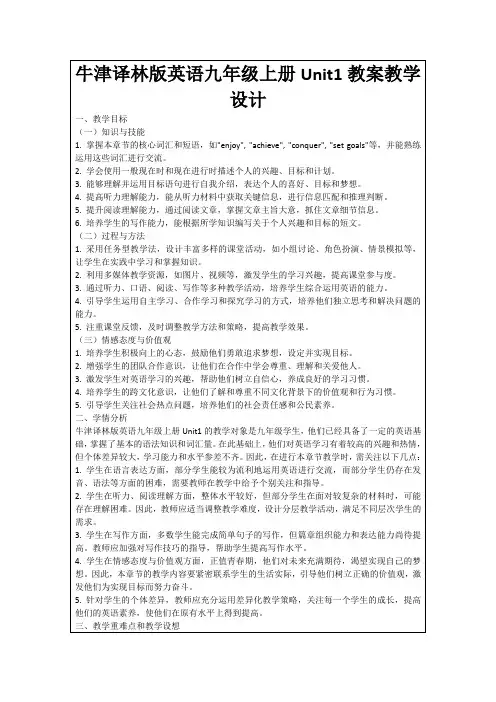
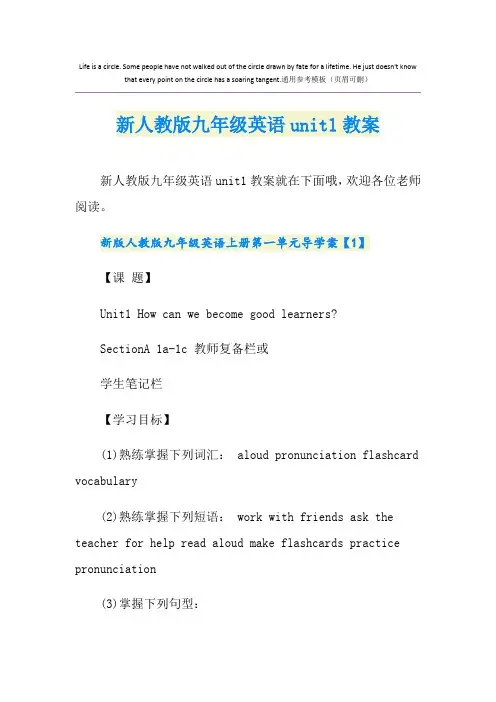
Life is a circle. Some people have not walked out of the circle drawn by fate for a lifetime. He just doesn't know that every point on the circle has a soaring tangent.通用参考模板(页眉可删)新人教版九年级英语unit1教案新人教版九年级英语unit1教案就在下面哦,欢迎各位老师阅读。
新版人教版九年级英语上册第一单元导学案【1】【课题】Unit1 How can we become good learners?SectionA 1a-1c 教师复备栏或学生笔记栏【学习目标】(1)熟练掌握下列词汇: aloud pronunciation flashcard vocabulary(2)熟练掌握下列短语: work with friends ask the teacher for help read aloud make flashcards practice pronunciation(3)掌握下列句型:--- How do you study for a test? --- I study by working with a group.【学习重点难点】掌握SectionA 1a-1c所有重点单词,短语和句型。
难点:介词by引导的方式状语的合理运用。
【学法指导】预习---听说---听力---对话—朗读---作业运用已有学习经验【教学过程】【教学过程】一、导入(启发探究 3分钟)How do you study for an English test? Maybe you have many different ways, now check() the ways you use in 1a. Then add other ways you sometimes use.二、自学(自主探究 6分钟)读一读,写一写aloud pronunciation flashcard vocabulary读一读,译一译make flashcards _______________work with friends _____________ask the teacher for help ______________read aloud _________________by making vocabulary lists _____________三、交流(合作探究 10分钟)同桌结对练习1a句型Work in pairs. Ask your partner how he or she studies for a test.eg: A: How do you study for a test?B: I study by working with a group.by makingflashcardsby working with friendsby asking the teacher for helpby reading aloudby making vocabulary lists同桌结对完成1b Listen. 并核对答案How do these students study for a test? Write letters from 1a above.小组合作完成1cMake conversations about how you study for a test四、总结(引深探究 15分钟)语法学习by+Ving( 1)by①—How do you study for a test? I study by working witha group.② We usually go to school by bike.③English is spoken by many people.by的意思是“通过……的方式”时,后接 ;当表示“乘坐”时,后跟 ;它还可以表示,用于被动语态,引导出动作的发出者。
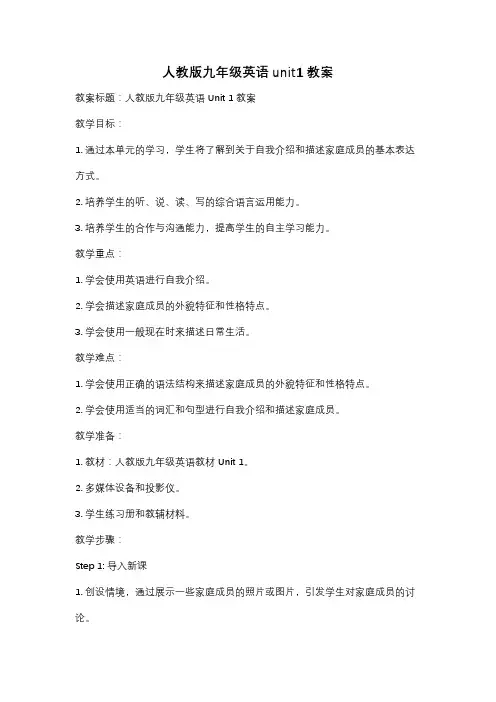
人教版九年级英语unit1教案教案标题:人教版九年级英语 Unit 1 教案教学目标:1. 通过本单元的学习,学生将了解到关于自我介绍和描述家庭成员的基本表达方式。
2. 培养学生的听、说、读、写的综合语言运用能力。
3. 培养学生的合作与沟通能力,提高学生的自主学习能力。
教学重点:1. 学会使用英语进行自我介绍。
2. 学会描述家庭成员的外貌特征和性格特点。
3. 学会使用一般现在时来描述日常生活。
教学难点:1. 学会使用正确的语法结构来描述家庭成员的外貌特征和性格特点。
2. 学会使用适当的词汇和句型进行自我介绍和描述家庭成员。
教学准备:1. 教材:人教版九年级英语教材 Unit 1。
2. 多媒体设备和投影仪。
3. 学生练习册和教辅材料。
教学步骤:Step 1: 导入新课1. 创设情境,通过展示一些家庭成员的照片或图片,引发学生对家庭成员的讨论。
2. 引导学生回忆和使用一些基本的英语句型来描述家庭成员,如"He has short hair. She is tall."Step 2: 学习新知1. 向学生介绍本单元的目标和重点,并给出相关的词汇和句型。
2. 使用多媒体设备展示相关的图片和例句,帮助学生理解和掌握新知识。
3. 学生跟读和模仿老师的发音和语调。
Step 3: 合作学习1. 将学生分成小组,让他们互相介绍自己和自己的家庭成员。
2. 鼓励学生使用本单元学到的句型和词汇来进行描述,老师可以提供必要的帮助和指导。
Step 4: 个人练习1. 学生个别完成练习册中的相关练习,巩固所学内容。
2. 教师巡视课堂,及时纠正学生的错误并给予指导。
Step 5: 拓展活动1. 让学生在家中进行采访,了解家庭成员的更多信息,并准备一份简短的报告。
2. 学生可以利用多媒体设备和投影仪展示自己的采访成果。
Step 6: 总结和评价1. 教师与学生一起回顾本节课所学的内容,并进行总结。
2. 教师给予学生积极的评价和鼓励,鼓励他们在日常生活中多使用英语进行交流。
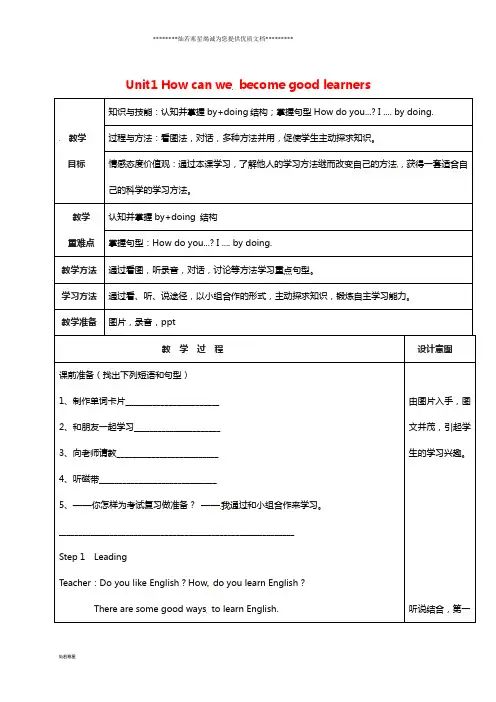
Unit1 How can we become good learners教学目标知识与技能:认知并掌握by+doing结构;掌握句型How do you...? I .... by doing.过程与方法:看图法,对话,多种方法并用,促使学生主动探求知识。
情感态度价值观:通过本课学习,了解他人的学习方法继而改变自己的方法,获得一套适合自己的科学的学习方法。
教学重难点认知并掌握by+doing 结构掌握句型:How do you...? I .... by doing.教学方法通过看图,听录音,对话,讨论等方法学习重点句型。
学习方法通过看、听、说途径,以小组合作的形式,主动探求知识,锻炼自主学习能力。
教学准备图片,录音,ppt教学过程设计意图课前准备(找出下列短语和句型)1、制作单词卡片________________________2、和朋友一起学习______________________3、向老师请教__________________________4、听磁带______________________________5、——你怎样为考试复习做准备?——我通过和小组合作来学习。
____________________________________________________________Step 1 LeadingTeacher:Do you like English?How do you learn English?There are some good ways to learn English. 由图片入手,图文并茂,引起学生的学习兴趣。
听说结合,第一Step 2 New lesson1.学生领读1a中的短语,教师纠正错误读音,学生识记短语后再添加其他的学习英语的方法并且熟悉by doing s th.的用法。
2.认真听录音,看看这些学生的学习方法,紧挨着名字写下图中的字母。
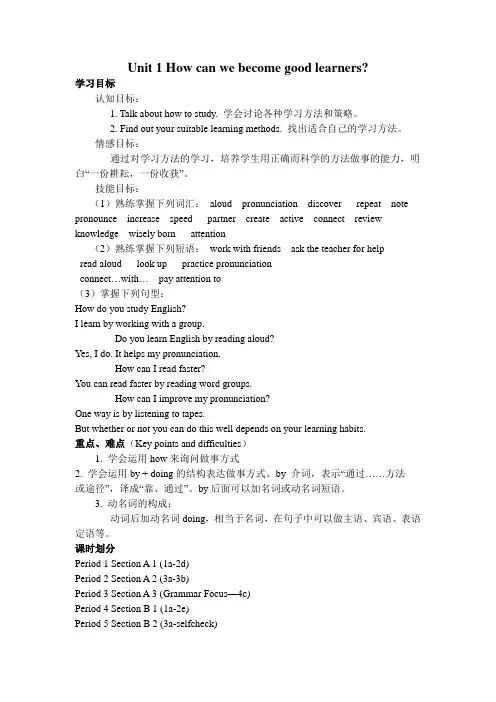
Unit 1 How can we become good learners?学习目标认知目标:1. Talk about how to study. 学会讨论各种学习方法和策略。
2. Find out your suitable learning methods. 找出适合自己的学习方法。
情感目标:通过对学习方法的学习,培养学生用正确而科学的方法做事的能力,明白“一份耕耘,一份收获”。
技能目标:(1)熟练掌握下列词汇:aloud pronunciation discover repeat note pronounce increase speed partner create active connect review knowledge wisely born attention(2)熟练掌握下列短语:work with friends ask the teacher for helpread aloud look up practice pronunciationconnect…with…pay attention to(3)掌握下列句型:How do you study English?I learn by working with a group.Do you learn English by reading aloud?Yes, I do. It helps my pronunciation.How can I read faster?You can read faster by reading word groups.How can I improve my pronunciation?One way is by listening to tapes.But whether or not you can do this well depends on your learning habits.重点、难点(Key points and difficulties)1. 学会运用how来询问做事方式2. 学会运用by + doing的结构表达做事方式。
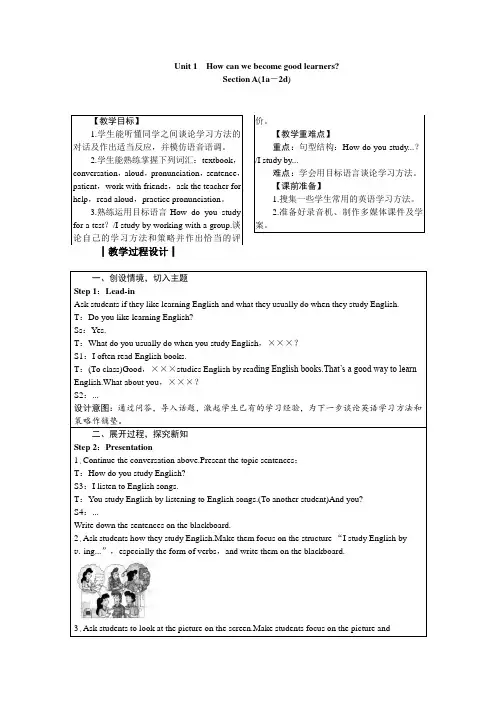

Unit 1How can we become good learners?类别课程标准要求掌握的项目单元话题Talk about how to study, in this unit, students learn to talk about how to study for a test and give advice to those who havedifficulties in studying.单元语法By + sth./doing sth.教学目标1.语言目标:理解重点句子,掌握学习英语的方法。
介词by引导的方式状语的合理运用。
2.技能目标:正确运用动名词谈论学习中的问题。
3.情感目标:通过开展角色表演等活动,培养学生阅读兴趣。
通过本单元的阅读,培养学生的文化意识,陶冶思想情操,让学生树立终身学习的道德素养。
学情分析英语的学习方法很多。
其实不是所有的学习方法都适合自己。
因此,我们要学会评价与判断,然后才能选择最适合自己的方法。
用下面的语言进行评价:I think studying Englishby…is…because…教学设计知识目标类别课时要点重点单词1.textbook n. 教科书;课本2.conversation n. 交谈;谈话3.aloud adv. 大声地;出声地4.pronunciation n. 发音;读音5.sentence n. 句子6.patientadj. 有耐心的n. 病人重点词组 1.make word cards 制作生词卡2.read the textbook 阅读教材3.ask the teacher for help 向老师求助课堂环节§自主学习案翻译下列词组。
1.通过制作生词卡by__making__word__cards2.通过听录音带by__listening__to__tapes3.向某人寻求帮助ask__sb.for__help4大声读来练习发音read__aloud__to__practice__pronunciation 5.小组合作学习study__with__a__group6.和朋友练习对话practice__conversations__with__friends7.逐个单词word__by__word8.作报告give__a__report9.意群word__groups10.慢慢来it__takes__time11.口语技能speaking__skills12英语口语spoken__English§课堂导学案Step 1 准备与热身(Preparation)Leadin with a free talk(自由对话导入新课)(2分钟)Greeting with the students:Hello, everyone.Welcome back to school.I'm very happy to see you again.Most of you got good grades last term ! Of course, don't lose your heart if you didn't get good grades.OK.Today, let's talk about how to study for a test and how to learn English well.T: How do you study English? Do you study English by the following ways? (Show some pictures and present the important phrases.) T: How do you study English?S: I study English by ________.working with friends making word cardsasking the teacher for help reading the textbookworking with a group listening to tapesStep 2 呈现与输入(Presentation)1.要求学生翻开课本P1,迅速阅读1a部分的内容。
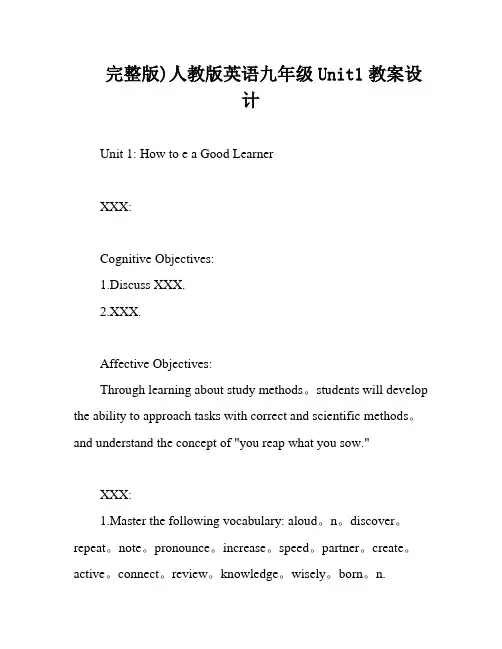
完整版)人教版英语九年级Unit1教案设计Unit 1: How to e a Good LearnerXXX:Cognitive Objectives:1.Discuss XXX.2.XXX.Affective Objectives:Through learning about study methods。
students will develop the ability to approach tasks with correct and scientific methods。
and understand the concept of "you reap what you sow."XXX:1.Master the following vocabulary: aloud。
n。
discover。
repeat。
note。
pronounce。
increase。
speed。
partner。
create。
active。
connect。
review。
knowledge。
wisely。
born。
n.2.Master the following phrases: work with friends。
ask the teacher for help。
read aloud。
look up。
practice n。
connect。
with。
pay n to.3.Master the following sentence structures:How do you study English?I learn by working with a group.Do you learn English by reading aloud?Yes。
I do。
It XXX.How can I read faster?You can read faster by reading word groups.How can I XXX?One way is by XXX.However。
九年级英语 unit1 教课方案【篇一:人教版九年级英语上册unit1 教课方案】人教版九年级英语上册教课方案unit 1 how can we become good learners ? 单元计划单元学习目标:1.能写出本单元的常用词汇和要点短语2.能正确运用how 来咨询做事方式,运用by +doing 的构造表达做事方式,3能描绘学习英语的方法,解决英语学习中的一些困难;学会解决生活的问题.单元重难点:1)能正确运用 how 来咨询做事方式,运用 by +doing 的构造表达做事方式,2)能描绘学习英语的方法,解决英语学习中的一些困难;学会解决生活的问题.1.要点词汇和短语大声地 _______ 发音 __________认识到;认识到_________快速地_______责任;义务_________ 影响 _________ 除非 _________ 使感人;使印象深刻_________范错;犯错__________ 此后;随后___________ 没关系___________惧怕去做__________嘲讽___________ 做笔录_____________ 查阅;查找___________ 办理;对付 __________将。
视为_____________生某人的气 _______________(指时间)过去____________全力做。
___________中断;忽然中断 ____________ 假造;构成 _____________结束做某事 _____________ 第一 __________________2.要点句型翻译1)你是如何准备考试的?我和朋友们一同学习。
2)你以前参加过学习小组吗?是的,参加过。
经过这类方式我学了很多。
3)我没有伙伴能够练习英语。
也许,你应当参加一个英语俱乐部。
4)大声朗诵来练习发音怎么样?你为何不参加一个英语俱乐部呢?5)为何你不参加英语俱乐部来练习你的英语呢?6)在老师的帮助下尽最大努力去学习是我们的职责。
人教版初中英语九年级全册《Unit 1 How can we Section B 2a3b 》优质课公开课课件、教案人教版九年级英语unit1复习导学案【复习目标】一、熟练掌握下列词汇: aloud pronunciation discover pronounce create active connect knowledge wisely born attention二、熟练掌握下列短语: ask the teacher for help look up be bornwith connect…with… pay attention to三、掌握下列句型:1. Because I wanted to understand thestory , I looked them up in a dictionary.2. Everyone is born with the ability to learn.3. Studies show that if you are interested in something, your brain is more active and it is also easier for you to pay attention to it for a long time.4. Good learners often connect what they need tolearn with something interesting.【重点、难点】1. 掌握how来询问做事方式。
2.掌握by+doing的结构表达做事方式。
by介词,表示“通过……方法或途径”,译成“靠、通过”。
by后面可以加名词或动名词短语。
3. 动名词的构成:动词后加动名词doing,相当于名词,在句子中可以做主语、宾语、表语定语等。
【知识梳理】1. I ___________ ask questions __________ my poor pronunciation.2. I ____________________________ this exciting and funny movie!3. So I _________________ watch other English movies, too.4. I _________ them ________ in a dictionary.5. I want to learn new words and more grammar so that I can___________________English movies.6. Everyone ___________________ the ability to learn.7. But whether or not you can do this well _________________ your learning habits.8. Research shows that successful learners have some good habits_____________________.9. Studies show that if you are interested in something , your brain is more active and it is also easier for you to ____________________ it for a long time. 10. _____________________ , they may _________________ by__________________ key words or by drawing mind maps.11. They also ___________________ ways to review what they have learned.12. Good learners often _______________ what they need to learn___________ something interesting.13. Knowledge _____________________ questioning.【重难点讲解】1. By asking the teacher for help.介词by 的用法:(1)、表示方式、方法或手段,后接名词或动名词,意为“使用某物;靠;乘(车船)等”。
Unit 1 The Changinging WorldTopic 1 Our country has developed rapidly.Section AThe main activity is 1a. 本课重点活动是1a。
Ⅰ. Teaching aims and demands 教学目标1. Learn some new words and a phrase:proper, by the way, bell, grandpa, chairwoman, grandson2. Learn a useful sentence: There goes the bell.3. Learn the present perfect tense:(1)Rita, you have just come back from your hometown.(2)—Where have you been, Jane?—I have been to Mount Huang with my parents.(3)—By the way, where’s Maria?—She has gone to Cuba to be a volunteer…4. Talk about the children’s vacation experiences.Ⅱ. Teaching aids 教具录音机/小黑板/学生的旅游纪念照/图片/幻灯片Ⅲ. Five-finger Teaching PlanStep 1 Review通过教师询问学生的暑期活动,导入话题,呈现部分生词。
T: Listen! The bell is ringing. Let’s begin our class! (教师解释The bell is ringing等于There goes ,板书bell,要求学生掌握。
)bellT: Nice to see you again. Did you enjoy your summer holiday?Ss: Yes.T: Hi, S1, where did you go during your summer holiday?S1: I went to …T: S2, did you go to your grandpa’s home?(板书grandpa,要求学生掌握。
Unit1 SectionA〔1a-2c〕精品教案【Teaching aims】知识目标:口、笔头掌握以下句型:1. A: How do you study for a test?B: I study by working with a group.2. What about reading aloud to practice pronunciation?3. A: Have you ever studied with a group?B: Yes, I have. I’ve learned a lot that way.熟练掌握词汇:textbook, conversation, aloud, pronunciation.技能目标:能用how引导的特殊疑问句和by短语对学习方法进展讨论。
情感态度:能与别人交流学习方法,形成相互交流相互促进的学习气氛。
Difficulties:1.以how引导的特殊疑问句。
2.用by短语对学习方法的表达。
【Teaching steps】Before listeningWarm-up and revision〔课堂热身和复习〕1.Read the English song on the screen.T: Before we begin, let’s read the song on the screen aloud, OK?2.Talk about the ways to study for a test.T: I know most of you are good at studying. Studying hard usually means you can get good grades in tests. Le t’s discuss ways you can study for a test.〔教学设计说明:song韵律流畅,节奏感强,朗朗上口,用它活泼气氛,激发兴趣;设置讨论学习方法的任务,激活思维,以此,了解学生的和未知。
新目标板九年级导学案Unit 1 How do you study for a test?2教师寄语:背诵是学好英语的好方法。
The first period Section A (1a —2c) 学习目标:1. 知识目标:口头和书面掌握以下句型:1.A:How do you study for a test? B: I study by working with a group.2.A:Have you ever studied with a group? B: Yes, I have. I've learned a lot that way. 熟练掌握词汇:aloud, pronunciation, flashcard, vocabulary. 2、技能目标:能用how 引导的问句和by+v-ing 短语讨论英语学习。
3、情感态度:能与别人交流学习方法,形成相互交流、相互促进的学习氛围。
预习准备: 英语四轮学习法第一轮:预习,查出障碍。
在复习旧课的基础上自学新课,查出理解障碍,以待上课解决。
第二轮:听课,破除障碍。
预习中形成的求解心理定势,使注意力集中指向教师所讲内容。
不懂就问,与老师和同学有问有答,共同破除障碍。
听课首先要全神贯注于听上,即使是对于自己知道的东西,也不可分心,因为这是训练听力的一个golden chance. 再者就是写和记,三者有机结合,才能取得最高效益。
第三轮:复习,扫除障碍。
在前两轮识记过的知识遗忘之前应及时复习,最好是应用于实践中,扫除理解上的障碍。
整理笔记,梳理出知识点,形成系统的知识结构。
第四轮:作业,学会应用。
对初步掌握的知识加深理解,强化记忆,进入应用的阶段。
【课堂活动】课堂学习过程: Before listening 1.观察1a 的图片,图中的人物都在做什么?用英语怎么说? 2.先在1a 中选出适合自己的学习方法,然后再补充你采用的其他方法。
While listening1.听1b.(听清by 后的动词) 选出你所听到的学习方法。
A: You did really well on the last English test, didn't you, Mei?B: Yeah, I did OK.A: Well, how did you s tudy?B: By____________________.A: Maybe I'll try that. How did you study, Pierre?C: By__________________. She was really happy I asked.A: That's interesting. How do you study, Antonio?D: I like to study by___________________. But sometimes my mother thinks I'm listening to music. And then she gets mad.2.根据录音完成1b.3.模仿秀:跟读,把你喜欢的句子按照原音调大声读出。
4.Pairwork: 分角色朗读听力材料。
5.Groupwork: 交流本组同学学习英语的方法并记录下来,找出相同的方法向全班同学汇报。
[来源:学.科.网Z.X.X.K]观察与思考:请你总结:向他人请教学习英语的方法应该用_________ 提问。
告诉他人 A.listening to tapes. B.Making flashcards C.Asking the teacher for help.Name Ways of learning English Similarities Differences2a,2b.1.快速浏览2a 中的5个问题,理解汉语意思。
2.Listen to 2a and check. (听清句中的关键词)3.Listen to 2b and match.4.Listen again and complete the dialogue.A: Welcome to the English club. Today we’re going to talk about the best ways to learn English. Who has an idea?B: Do you learn English by _________________ English-language videos?A: No. it’s too hard to understand the voices.B: What about ____________ a diary in English? Do you learn English that way?A:I think so. It helps to write English every day.C: Have you ever studied _______________a group?A: Yes, I have! I’ve learned a lot that way.B: Do you ever _______________ conversations with friends?A: Oh, yes. It improves my speaking skillsC: What about reading ______________ to practice pronunciation?B: I do that sometimes. I think it helps.A: I do too. And I always ______________ ______________ new words in a dictionary.B: That’s a great idea!5.模仿秀:跟读,模仿语音语调。
6.Pairwork:After listening: Pairwork 1c,2c训练巩固:Make a survey: Ask your classmates (at least 3 classmates) how he or she studies for a test and learns English. Like this:A: How do you study for a test? B:________A: How do you learn English? B:_________A: Do you learn English by reading aloud? B:_________________________A: Do you ever practice conversations with friends? B:____________________A: Have you ever studied with a group? B:_____________________________【课堂反思】:你学会的短语、句型和交际用语,写下来吧。
Phrases: Sentences:_________________________________________________________2.将你学到的学习方法记录下来,在以后的学习中,你能学以致用。
【家庭作业】:1.熟练掌握本课的语言结构,总结你所学的其后用v-ing 的动词和短语。
_____________________________________________________________________________ 2.编写对话:你和你的英国朋友Mike 互相请教学习英语和汉语的方法。
_______________________________________________________________________________ _______________________________________________________________________________Section A The second period (3a--4)学习目标:口头及书面掌握以下句子:1.Lillian Li, for example, said the best way to learn new words was by reading English magazines.2.She said that memorizing the words of pop songs also helped a little.3.Sometimes, however, he finds watching movies frustrating because the people speak too quickly.4.We get excited about something and then end up speaking in Chinese.熟练掌握词汇:differently, quickly, specific, memorize, grammar, frustrate, add.[来源:]技能目标:对各种学习方法进行讨论,探讨最佳学习方法。
情感态度:能根据自己的实际情况采用适合自己的学习方法,形成个性化的学习方法。
课前准备:I.列举你的学习方法:经常用的often:___________________________________有时用的sometimes:_______________________________________________从没用的never:________________________________________________II.你认为那些学习英语的方法是最佳的,那些是最不实用的?The best way to learn English reasonThe way that isn't helpful at all reason语言点导学练:1.look up查书、参考资料、字词典等。
Do you often __________ the new words in a dictionary?课堂学习过程:Before reading:Pairwork: 根据课前讨论的内容进行结对练习,阐明自己的观点并说明理由。
A:How do you often/ sometimes learn English? B:I often/sometimes learn by...[来源:Z。